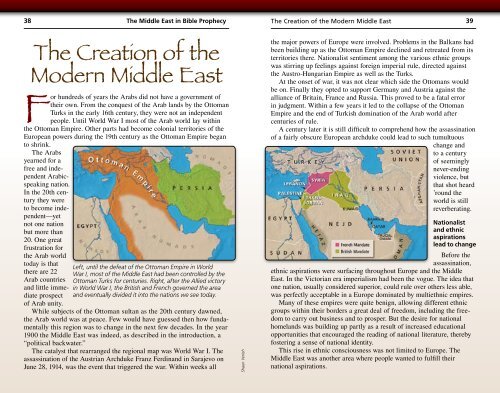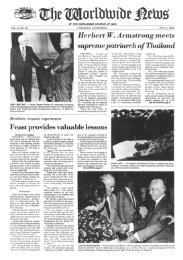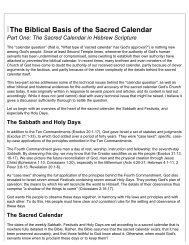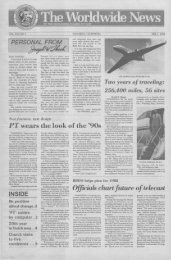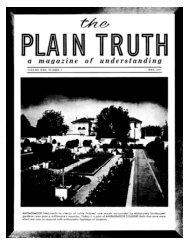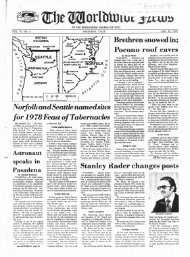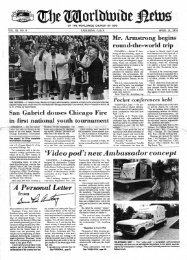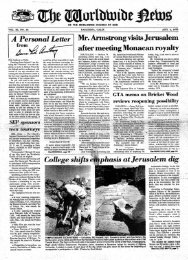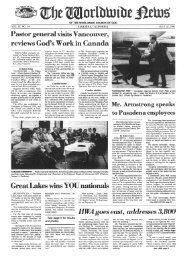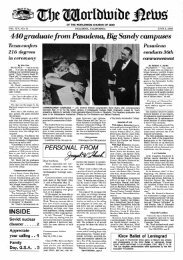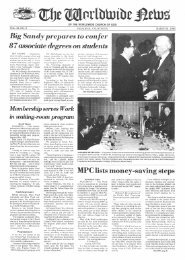The Middle East in Bible Prophecy - United Church of God
The Middle East in Bible Prophecy - United Church of God
The Middle East in Bible Prophecy - United Church of God
You also want an ePaper? Increase the reach of your titles
YUMPU automatically turns print PDFs into web optimized ePapers that Google loves.
38 <strong>The</strong> <strong>Middle</strong> <strong>East</strong> <strong>in</strong> <strong>Bible</strong> <strong>Prophecy</strong> <strong>The</strong> Creation <strong>of</strong> the Modern <strong>Middle</strong> <strong>East</strong><br />
39<br />
<strong>The</strong> Creation <strong>of</strong> the<br />
Modern <strong>Middle</strong> <strong>East</strong><br />
For hundreds <strong>of</strong> years the Arabs did not have a government <strong>of</strong><br />
their own. From the conquest <strong>of</strong> the Arab lands by the Ottoman<br />
Turks <strong>in</strong> the early 16th century, they were not an <strong>in</strong>dependent<br />
people. Until World War I most <strong>of</strong> the Arab world lay with<strong>in</strong><br />
the Ottoman Empire. Other parts had become colonial territories <strong>of</strong> the<br />
European powers dur<strong>in</strong>g the 19th century as the Ottoman Empire began<br />
to shr<strong>in</strong>k.<br />
<strong>The</strong> Arabs<br />
yearned for a<br />
free and <strong>in</strong>dependent<br />
Arabicspeak<strong>in</strong>g<br />
nation.<br />
In the 20th century<br />
they were<br />
to become <strong>in</strong>dependent—yet<br />
not one nation<br />
but more than<br />
20. One great<br />
frustration for<br />
the Arab world<br />
today is that<br />
there are 22<br />
Arab countries<br />
and little immediate<br />
prospect<br />
<strong>of</strong> Arab unity.<br />
Left, until the defeat <strong>of</strong> the Ottoman Empire <strong>in</strong> World<br />
War I, most <strong>of</strong> the <strong>Middle</strong> <strong>East</strong> had been controlled by the<br />
Ottoman Turks for centuries. Right, after the Allied victory<br />
<strong>in</strong> World War I, the British and French governed the area<br />
and eventually divided it <strong>in</strong>to the nations we see today.<br />
While subjects <strong>of</strong> the Ottoman sultan as the 20th century dawned,<br />
the Arab world was at peace. Few would have guessed then how fundamentally<br />
this region was to change <strong>in</strong> the next few decades. In the year<br />
1900 the <strong>Middle</strong> <strong>East</strong> was <strong>in</strong>deed, as described <strong>in</strong> the <strong>in</strong>troduction, a<br />
“political backwater.”<br />
<strong>The</strong> catalyst that rearranged the regional map was World War I. <strong>The</strong><br />
assass<strong>in</strong>ation <strong>of</strong> the Austrian Archduke Franz Ferd<strong>in</strong>and <strong>in</strong> Sarajevo on<br />
June 28, 1914, was the event that triggered the war. With<strong>in</strong> weeks all<br />
Shaun Venish<br />
the major powers <strong>of</strong> Europe were <strong>in</strong>volved. Problems <strong>in</strong> the Balkans had<br />
been build<strong>in</strong>g up as the Ottoman Empire decl<strong>in</strong>ed and retreated from its<br />
territories there. Nationalist sentiment among the various ethnic groups<br />
was stirr<strong>in</strong>g up feel<strong>in</strong>gs aga<strong>in</strong>st foreign imperial rule, directed aga<strong>in</strong>st<br />
the Austro-Hungarian Empire as well as the Turks.<br />
At the onset <strong>of</strong> war, it was not clear which side the Ottomans would<br />
be on. F<strong>in</strong>ally they opted to support Germany and Austria aga<strong>in</strong>st the<br />
alliance <strong>of</strong> Brita<strong>in</strong>, France and Russia. This proved to be a fatal error<br />
<strong>in</strong> judgment. With<strong>in</strong> a few years it led to the collapse <strong>of</strong> the Ottoman<br />
Empire and the end <strong>of</strong> Turkish dom<strong>in</strong>ation <strong>of</strong> the Arab world after<br />
centuries <strong>of</strong> rule.<br />
A century later it is still difficult to comprehend how the assass<strong>in</strong>ation<br />
<strong>of</strong> a fairly obscure European archduke could lead to such tumultuous<br />
change and<br />
to a century<br />
<strong>of</strong> seem<strong>in</strong>gly<br />
never-end<strong>in</strong>g<br />
violence, but<br />
that shot heard<br />
’round the<br />
world is still<br />
reverberat<strong>in</strong>g.<br />
Nationalist<br />
and ethnic<br />
aspirations<br />
lead to change<br />
Before the<br />
assass<strong>in</strong>ation,<br />
ethnic aspirations were surfac<strong>in</strong>g throughout Europe and the <strong>Middle</strong><br />
<strong>East</strong>. In the Victorian era imperialism had been the vogue. <strong>The</strong> idea that<br />
one nation, usually considered superior, could rule over others less able,<br />
was perfectly acceptable <strong>in</strong> a Europe dom<strong>in</strong>ated by multiethnic empires.<br />
Many <strong>of</strong> these empires were quite benign, allow<strong>in</strong>g different ethnic<br />
groups with<strong>in</strong> their borders a great deal <strong>of</strong> freedom, <strong>in</strong>clud<strong>in</strong>g the freedom<br />
to carry out bus<strong>in</strong>ess and to prosper. But the desire for national<br />
homelands was build<strong>in</strong>g up partly as a result <strong>of</strong> <strong>in</strong>creased educational<br />
opportunities that encouraged the read<strong>in</strong>g <strong>of</strong> national literature, thereby<br />
foster<strong>in</strong>g a sense <strong>of</strong> national identity.<br />
This rise <strong>in</strong> ethnic consciousness was not limited to Europe. <strong>The</strong><br />
<strong>Middle</strong> <strong>East</strong> was another area where people wanted to fulfill their<br />
national aspirations.


